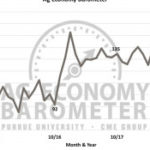Contact Us to learn more about our services.
Ag Barometer holds steady, but farmers concerned about farm bill delay
Farmers more optimistic that current trade disputes will not hurt long-run growth prospects for U.S. ag exports.
 Agricultural producer optimism held steady in November, although concern surrounds the lack of a farm bill, results from the latest Purdue University/CME Group Ag Economy Barometer showed. The November barometer reading, which utilizes a survey of 400 agricultural producers from across the country, was 134, only 1% lower than October and near levels seen last spring before trade disruptions began.
Agricultural producer optimism held steady in November, although concern surrounds the lack of a farm bill, results from the latest Purdue University/CME Group Ag Economy Barometer showed. The November barometer reading, which utilizes a survey of 400 agricultural producers from across the country, was 134, only 1% lower than October and near levels seen last spring before trade disruptions began.
The barometer’s two sub-indices remain mostly unchanged from October; the Index of Current Conditions held at 115, and the Index of Future Expectations dropped 3 points to a reading of 143.
“Although there was a modest decline in the barometer this month, there was some evidence that producers are becoming more confident regarding the U.S. agricultural economy’s future,” said James Mintert, the barometer’s principal investigator and director of Purdue University’s Center for Commercial Agriculture.
That confidence can be seen in producers’ attitudes towards their willingness to make large farm investments, he added. Each month producers are asked whether now is a “good time” or “bad time” to make a large investment in buildings and machinery. Their responses are used to produce a large investment index. In November, that investment index stood at 56, up from 52 in October and 10 points higher than in September of 2018 when the index set a new low of 42.
Producers were also more optimistic regarding their long-term perspective on farmland values, with 50% expecting higher farmland values over the next 5 years, a sharp departure from a month earlier when just 21% said they expected higher farmland values.
However, this increase in confidence was not driven by expected improvements in profitability, the results showed. In November, only 13% of respondents said they expect farm profitability to improve in the next 12 months. When asked about farmers’ equity position, 44% expect to see equity diminish in the upcoming year. Rising interest rates could also be a factor in these perceptions as a rise in interest rates can impact profitability and the value of large farm assets. When asked, 85% of producers said they expect interest rates to rise in the next year and 76% expect to see a rise in the next 5 years compared to 2018.
With November marking an end to the mid-term election cycle, producers were asked whether they were concerned that Congress had not passed new farm bill legislation. Seventy-five percent of respondents said they were either “somewhat or very concerned,” 33% said they were “very concerned,” and 24% said they were “not at all concerned” about the lack of new farm bill legislation.
On the trade front, results showed farmers are actually becoming more optimistic that current trade disputes will not hurt long-run growth prospects for U.S. ag exports. April’s survey revealed 46% of respondents expected ag exports to increase over the next five years. In July, this percentage rose to 49%, and in August, it rose again to 54%. On the November survey, 66% of respondents said they expect U.S. ag exports to increase over the next five years. Additionally, the percentage of producers that expect ag exports to decrease fell from 21% in July to 14% in August and to 10% in November.

